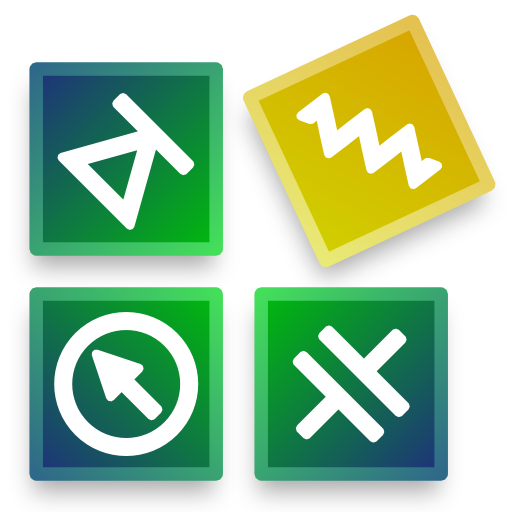
このページには広告が含まれます

Droid Tesla Pro
ツール | Vladimir Djokic Djole
BlueStacksを使ってPCでプレイ - 5憶以上のユーザーが愛用している高機能Androidゲーミングプラットフォーム
Play Droid Tesla Pro on PC
DroidTesla is a simple and powerful circuit simulator.
Perfect for students new to electronics circuit design and construction,
hobbyist and tinkerers and even seasoned professionals who want a quick,
handy tool to perform electronics circuit design calculations.
That's interactivity and innovation you can't find in best SPICE tools for PC like Multisim, LTspice, OrCad or PSpice (trademarks belong to their respective owners).
DroidTesla simulator solves basic resistive circuits using Kirchoff’s Current Law (KCL)
in much the same way a student in a circuits class would,the simulator systematically forms a matrix in accordance
with KCL and then proceeds to solve for the unknown quantities using various algebraic
techniques such as Gaussian elimination and sparse matrix techniques.
For non-linear components, such as the diode and BJT ,DroidTesla engine searching for the approximate solution by making an initial guess at an answer
and then improving the solution with successive calculations built upon this guess.
This is called an iterative process.DroidTesla simulation uses the Newton-Raphson iterative algorithm
to solve circuits with non-linear I/V relationships.
For reactive elements(capacitors and inductors),the DroidTesla uses numeric integration methods to approximate the state of the reactive elements as a function of time.
DroidTesla offers the Trapezoidal(I'll add a GEAR method later) integration methods to approximate the state of the reactive elements.
Although for most circuits, both methods will provide almost identical results,
it is generally regarded that the Gear method is more stable, but trapezoidal method is faster and more accurate.
DroidTesla for now can simulate:
-Resistor
-Capacitor
-Inductor
-Potentiometer
-Light Bulb
-Ideal operational amplifier
-Bipolar junction transistor (NPN PNP)
-MOSFET N-channel depletion
-MOSFET N-channel enhancement
-MOSFET P-channel depletion
-MOSFET P-channel enhancement
-JFET N and P
-PN Diode
-PN Led diode
-PN Zener diode
-AC current source
-DC current source
-AC voltage source
-DC voltage(battery) source
-CCVS - current controlled voltage source
-CCCS - current controlled current source
-VCVS - voltage controlled voltage source
-VCCS - voltage controlled current source
-Square wave voltage source
-Triangle wave voltage source
-AC ampermeter
-DC ampermeter
-AC voltmeter
-DC voltmeter
-Two channe oscilloscope
-SPST Switch
-SPDT Switch
-Voltage controlled switch
-Current controlled switch
-AND
-NAND
-OR
-NOR
-NOT
-XOR
-XNOR
-JK flip-flop
-7 Segment Display
-D flip-flop
-Relay
-IC 555
-Transformer
-Graetz Circuit
If you are making an
oscillators you have to put a small initial value on some of the
reactive elements.(see the examples)
Perfect for students new to electronics circuit design and construction,
hobbyist and tinkerers and even seasoned professionals who want a quick,
handy tool to perform electronics circuit design calculations.
That's interactivity and innovation you can't find in best SPICE tools for PC like Multisim, LTspice, OrCad or PSpice (trademarks belong to their respective owners).
DroidTesla simulator solves basic resistive circuits using Kirchoff’s Current Law (KCL)
in much the same way a student in a circuits class would,the simulator systematically forms a matrix in accordance
with KCL and then proceeds to solve for the unknown quantities using various algebraic
techniques such as Gaussian elimination and sparse matrix techniques.
For non-linear components, such as the diode and BJT ,DroidTesla engine searching for the approximate solution by making an initial guess at an answer
and then improving the solution with successive calculations built upon this guess.
This is called an iterative process.DroidTesla simulation uses the Newton-Raphson iterative algorithm
to solve circuits with non-linear I/V relationships.
For reactive elements(capacitors and inductors),the DroidTesla uses numeric integration methods to approximate the state of the reactive elements as a function of time.
DroidTesla offers the Trapezoidal(I'll add a GEAR method later) integration methods to approximate the state of the reactive elements.
Although for most circuits, both methods will provide almost identical results,
it is generally regarded that the Gear method is more stable, but trapezoidal method is faster and more accurate.
DroidTesla for now can simulate:
-Resistor
-Capacitor
-Inductor
-Potentiometer
-Light Bulb
-Ideal operational amplifier
-Bipolar junction transistor (NPN PNP)
-MOSFET N-channel depletion
-MOSFET N-channel enhancement
-MOSFET P-channel depletion
-MOSFET P-channel enhancement
-JFET N and P
-PN Diode
-PN Led diode
-PN Zener diode
-AC current source
-DC current source
-AC voltage source
-DC voltage(battery) source
-CCVS - current controlled voltage source
-CCCS - current controlled current source
-VCVS - voltage controlled voltage source
-VCCS - voltage controlled current source
-Square wave voltage source
-Triangle wave voltage source
-AC ampermeter
-DC ampermeter
-AC voltmeter
-DC voltmeter
-Two channe oscilloscope
-SPST Switch
-SPDT Switch
-Voltage controlled switch
-Current controlled switch
-AND
-NAND
-OR
-NOR
-NOT
-XOR
-XNOR
-JK flip-flop
-7 Segment Display
-D flip-flop
-Relay
-IC 555
-Transformer
-Graetz Circuit
If you are making an
oscillators you have to put a small initial value on some of the
reactive elements.(see the examples)
Droid Tesla ProをPCでプレイ
-
BlueStacksをダウンロードしてPCにインストールします。
-
GoogleにサインインしてGoogle Play ストアにアクセスします。(こちらの操作は後で行っても問題ありません)
-
右上の検索バーにDroid Tesla Proを入力して検索します。
-
クリックして検索結果からDroid Tesla Proをインストールします。
-
Googleサインインを完了してDroid Tesla Proをインストールします。※手順2を飛ばしていた場合
-
ホーム画面にてDroid Tesla Proのアイコンをクリックしてアプリを起動します。



